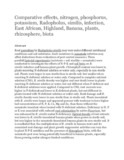Comparative effects of nitrogen, phosphorus and potassium on Radopholus similis infection in East African Highland Banana plants as influenced by rhizosphere biota
Abstract
Root parasitism by Radopholus similis may vary under different nutritional conditions and soil substrates. Such variations in nematode infection may affect deductions from evaluations of pest control measures. Three parallel factorial experiments (nutrients × soil sterility × nematode) were conducted to investigate the effects of N-P-K and soil biota on R. similis infection and banana plant growth. Chlorophyll content was lower in plants receiving N-deficient solution or water only, especially in non-sterile soil. Plants were larger in non-sterile than in sterile soil; but smaller when receiving N-deficient solution or water only. Compared to complete nutrient solution (CNS), R. similis density was higher and root death lower in plants receiving N-deficient solution or water, but not different when P-deficient and K-deficient solutions were applied. Compared to CNS, root necrosis was higher in P-deficient and lower in K-deficient plants, but not different in plants treated with N-deficient solution or water only. Root damage and R. similis density were lower in non-sterile than in sterile soil. Plants inoculated with R. similis were larger and appeared greener with tendency to have higher leaf concentrations of N, P, K, Ca, Mg and Zn, than those without the nematode inoculant when treated with N-deficient solution. Deficiency in N, P or K was associated with reduced root colonization by native Fusarium, but was enhanced by R. similis under N-deficiency. Optical density of root extracts was lower in R. similis-inoculated banana plants when grown in sterile soil, but was higher in the nematode-inoculated banana plants in non-sterile soil. It is concluded that, the multiplication of R. similis in banana roots and its associated root damage and plant growth suppressive activities can vary due to plant N-P-K nutrition and the presence of rhizosphere biota, with the nematode pest even being potentially beneficial to banana plants, especially those growing under nitrogen-limited conditions.
URI
https://doi.org/10.1016/j.sciaf.2022.e01320https://www.sciencedirect.com/science/article/pii/S2468227622002277?via%3Dihub
http://ir-library.mmust.ac.ke:8080/xmlui/handle/123456789/2100
Collections
- Gold Collection [1031]

